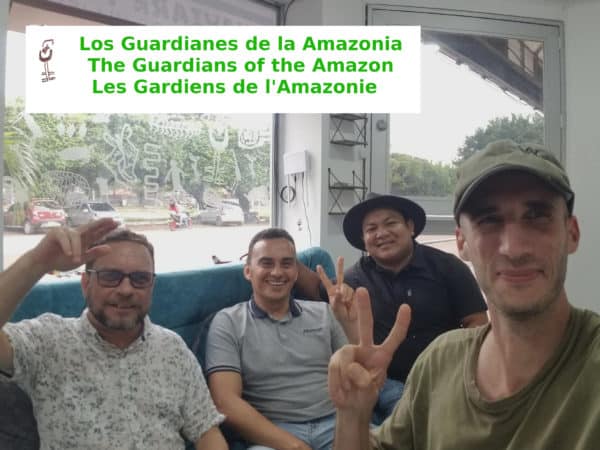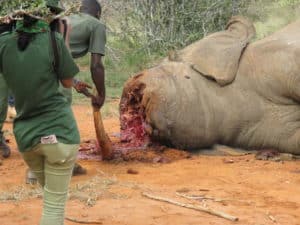Safari Club International is an extremely efficient lobbying organisation that may have made a mistake demonstrating how powerful they are. During the “African Wildlife Consultative Forum” in Arusha, the U.S. Fish and Wildlife Service lifted the ban on import of Zimbabwe elephant trophies. The problem is that Safari Club International announced the ban as aiming not only to Zimbabwe, but also to Zambia. Should we expect soon a new lift, due to the pressure of the hunter’s lobbying group?
Who is Safari Club International?
Safari Club International (SCI) is a powerful US lobbying organisation which promotes hunting worldwide. They claim to have more than 50,000 members and 180 local chapters. In its last fiscal year, the Club spent over USD 8 million in fundraising, out of 22 million of total expenses. They have a Foundation (SCIF) that is in consultative status with ECOSOC, meaning that SCIF can enter the United Nations and any specialised agency, lobby 193 member-states, and take the floor during any official event (if NGOs are given the floor). The NGO pretends that hunting equals to conservancy, since hunting regulates animal population and supports local community. Should you be tempted to believe this narrative, read the exhaustive National Geographic’s article “Is Trophy Hunting Helping Save African Elephants?”. For the lazy readers: it does not, since corruption prevents the local population to get the money spent by hunters.
The Foundation co-organised with the Tanzania government, from 13 to 17 November the 15th “African Wildlife Consultative Forum” in Arusha, Tanzania. On the occasion of the event, the U.S. Fish and Wildlife Service (FWS) announced the lift of the ban on trophy from Zambia and Zimbabwe, reversing a previous decision of Obama’s administration. They were “honored that the FWS chose the AWCF as the forum to make these significant announcements. SCI will continue to work with the FWS in additional efforts to conserve African wildlife through sustainable use.”
Let’s have the big picture: SCI fights unfavourable regulations and laws, SCIF promotes at the international hunting as a “conservancy tool”. The two entities therefore divide the work:
- SCI lobbies the US congressmen and agencies and SCI’s lawyers regularly challenge in court (aka strategic litigation) the United States Secretary of the Interior, aiming at changing “bad laws and decisions”: “Each year at the SCI Convention, SCI attorneys and other guest leaders in the fields of hunting, firearms, wildlife conservation and importation present a highly rated continuing legal education course for lawyers“. They successfully challenged previous Obama’s administration ban and achieved to push back the start date of its ban from 4 April 2014 to 12 May 2014.
- SCIF promotes specific policies among the African Union, runs education programs, and raise awareness on hunting “benefits”, such as their anti-poaching efforts. They pretend to be a normal NGO fighting for the greater good. SCIF is the carrot, while SCI is the stick.
Lobbying and the U.S. Fish and Wildlife Service
The system put in place by those two entities is effective. It is no coincidence if FWS announced the lift at SCI/SCIF. But if we look at the ban/unban process authorised by FWS, a discrepancy should catch our attention. In fact, the FWS’s 2014 ban reads as follows: “The U.S. Fish and Wildlife Service today announced a suspension on imports of sport-hunted African elephant trophies taken in Tanzania and Zimbabwe during calendar year 2014”. The ban was subsequently renewed for 2015. But more importantly, we should pay attention to “Tanzania and Zimbabwe”. FWS does not mention of Zambia but Tanzania. The recent lift targets only Zimbabwe, not Zambia. 3 lessons:
- Tanzania is one of the most affected African country by poaching and legal hunting. In six years, its elephant population dropped by 60%. Tanzania’s ban is currently under review by FWS. We cannot foresee FWS to lift the ban in the near future, unless SCIF and SCI to be very persuasive.
- As said above, SCI’s press release mentions Zambia; FWS does not. This is suspicious, as FWS introduced the lift during the SCI/SCIF event. SCI/SCIF knew the content of FWS’ statement before anyone else. They cannot be misled. They advocated for years for this result.
- Seems like Zimbabwean elephants are going to be slaughtered. No solution here, unless Zims get a pro-conservancy new leader.
Now taking into consideration that SCI/SCIF is extremely well informed about laws and regulations, the question arises: should we expect in the near future Zambia, or even worst, Tanzania, to be included in a list of countries where FWS allows hunters to kill elephants? Only SCI/SCIF knows. The influence they have on FWS can only be compared to the hatred for the Obama’s administration.

